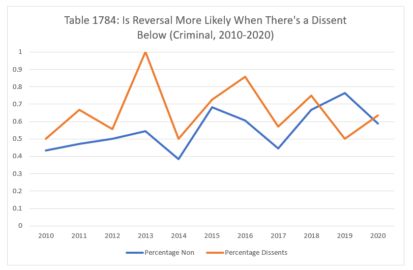So we've determined that a dissent at the Appellate Court is only a moderate indication that reversal is statistically more likely at the Supreme Court in civil cases. So what about criminal cases?
Between 2010 and 2020, 64% of criminal cases with a dissent below were reversed at the Supreme Court. The reversal rate for unanimous criminal decisions was 53.33%.
In all, the reversal rate for divided decisions was higher than for unanimous decisions in ten of the eleven years between 2010 and 2020. Lopsided years were 2011 (66.67% for divided decisions, 47.22% for unanimous ones); 2013 (100% to 54.55%); 2016 (85.71% to 60.71%); and 2017 (57.14% to 44.44%).
Across the entire thirty-one years from 1990 to 2020, divided criminal decisions were reversed 65.57% of the time, while unanimous decisions were reversed 47.16% of the time. So yes, the presence of a dissent at the Appellate Court means that reversal at the Supreme Court in a criminal case is significantly more likely.

Join us back here next time as we begin another new topic.
The content of this article is intended to provide a general guide to the subject matter. Specialist advice should be sought about your specific circumstances.
